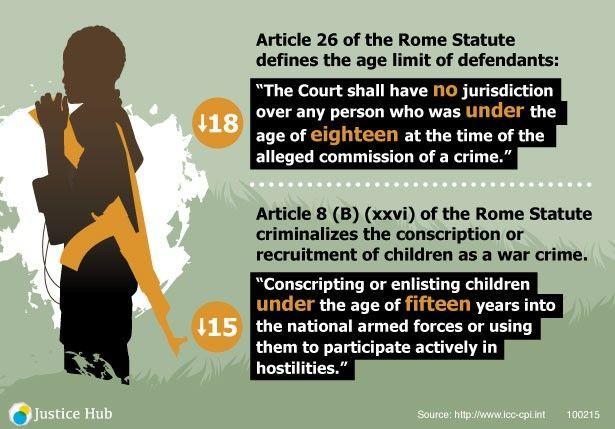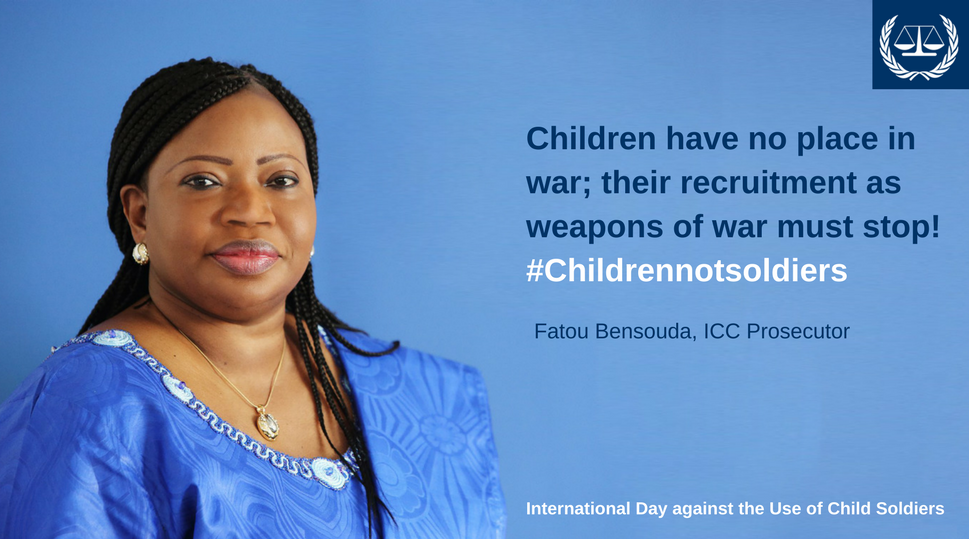The ICC agrees: Children, not soldiers
Commanders held to account under the Rome Statute

Children under 15 are not always conscripted or forced into armed service, but however they join, those commanding them can be held to account.
With more than 140 states already party to the UN Child Convention's Optional Protocol on the Involvement of Children in Armed Conflict, the ICC has emerged as a new and formidable tool in pressing states and armed groups to assume their legal responsibilities to protect children from direct participation in hostilities.
By joining the Rome Statute, 124 states have agreed to investigate and prosecute individuals accused of genocide, crimes against humanity and war crimes, including the enlistment and conscription of child soldiers under the age of 15, as well as using them to participate actively in hostilities.
While international prosecution is bringing hope to the most vulnerable group in conflict zones worldwide, the ICC is ultimately a court of last resort, meaning states must assume the mantle and do much more to end this brutal practice and protect children.
Pressing inclusive peace processes
Despite being considered a war crime under international law, conscription of child soldiers is still practiced in many regions. The ICC has ongoing cases, investigations or preliminary investigations in several long-running conflict situations featuring the use of child soldiers, including in the Democratic Republic of the Congo (DRC), Uganda and Colombia.
In Colombia, and under the watchful eye of an ICC preliminary examination, children conscripted into rebel groups are being released and provided with specialized services to ease their reintegration into society. The year ahead could illuminate the role of the ICC on behalf of child soldiers in peace processes worldwide.
Read more about the facts and figures on child soldiers.
Raising important questions: the status of child soldiers
Dominic Ongwen, a former LRA abductee and child soldier, is currently on trial at the ICC for crimes he committed as an adult. Many are pointing to the unique and extremely relevant questions the case has evoked over the culpability of former child soldiers. The ICC prosecutor’s statement at the trial opening reflects on this duality of victim and perpetrator. Some are already taking a stronger position, suggesting Ongwen’s past should be treated as a mitigating factor.
Highlighting how vulnerable child soldiers truly are
The ICC has laid bare the fact that children truly are among the most vulnerable groups in conflict – and its resounding response has bolstered its position as a leading advocate of justice for child soldiers. During the Bosco Ntaganda trial, the ICC took the important step of recognizing that child soldiers can themselves be victims of sexual and gender-based war crimes committed by members of their own armed forces.
ICC prosecutor: making crimes against children a top priority

The ICC prosecutor’s Policy on Children, launched in November 2016, seeks to ensure that children’s needs are addressed at all stages of the criminal process, from preliminary examination to sentencing. This special sensitivity to crimes against and affecting children has already become visible in the ICC reparations stage, and an increasingly focused ICC-wide approach, including the prosecutor's, may prove crucial to avoid deepening tensions in yet-to-be-resolved conflicts featuring child soldiers.
Reparations emphasizing the need to rehabilitate
The conscription and use of child soldiers was central to the Court’s first ever guilty verdict, in the case against Congolese warlord Thomas Lubanga - and now former child soldiers stand to benefit from the first ICC-ordered reparations plan. The Trust Fund for Victims (TFV) and its local implementing partners will not only look to provide psychological support to former child soldiers and their families, but also vocational training around those skills that will help former child soldiers improve their post-conflict lives.
Read more about the TFV’s efforts in relation to reparations for former child soldiers.
A fighting chance: Former child soldiers started a boxing school for Congo’s youth. Read the full story.
Have your say - What do you think of the ICC's example?
